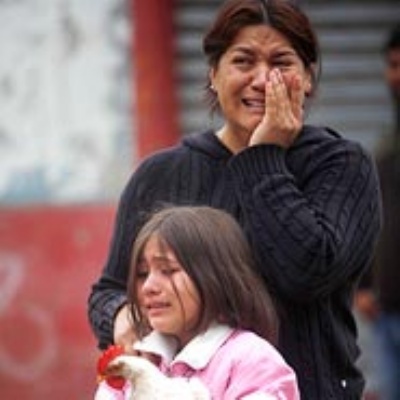
Chilean authorities today extended a night curfew to midday as thousands of troops struggled to contain worsening looting and crime in the wake of the devastating earthquake.
Despite the heavy military presence in the badly damaged city of Concepción, looters burnt stores and residents complained of deteriorating security and slow government delivery of food and other basic supplies. Soldiers fired teargas in efforts to restrict disorder and one person was shot dead.
Residents of the city, with a population of 600,000, said they were organising groups to defend their properties from robbers and looters.
The governor of the region, Jaime Tohá, said that 55 people were arrested on Sunday night for violating the curfew after looters raided almost every market in the city. Some residents rifled through abandoned supermarkets for basic supplies while others took advantage of the crisis to rob banks and empty stores of luxury goods.
The Deputy Interior Minister, Patricio Rosende, said that another 105 people were arrested yesterday for looting and other crimes, and that one person had been shot dead during the night. “Shots were fired. Police took control of the area,” he said, without giving details. Last night the roof of a supermarket in Concepción collapsed when looters set fire to it after police tried to disperse them.
The city's Mayor has said the criminal elements were now becoming more organised and systematic following Saturday morning's 8.8-magnitude quake that killed at least 723 people.
Mayor Jacqueline Van Rysselberghe warned against serious “social tension” in the city. “We need food for the people. We are without supplies, and if we don't resolve that we are going to have serious security problems during the night,” she said. “We are at the end of the month. There are no stocks in the households. But nothing justifies looting, vandalism and theft. We have seen people coming out of supermarkets with plasma screens. If we don't resolve this problem of food today, we could have a very confrontational situation.”
Eduardo Aundez, a Spanish professor, said: “I feel abandoned by the authorities. We believe the Government didn't take the necessary measures in time, and now supplies of food and water are going to be much more complicated.”
A series of strong aftershocks — some up to magnitude 6.9 — have driven thousands to flee their homes, setting up tents and makeshift shelters.
Caroline Contreras, a 36-year-old teacher, said: “Government help has been so slow to arrive. The soldiers just arrived and haven't been able to control the situation. The neighbours where I live are organising to defend themselves because people are starting to rob houses.”
President Michelle Bachelet, who condemned the “pillage and criminality”, dispatched 7,000 soldiers to the region and imposed curfews to restore order, saying her Government was sending emergency food and medicine supplies.
The Government has acknowledged that it has battled to provide aid swiftly because of ruined roads and major power disruptions caused by the quake.
The aid effort suffered a blow last night when a small aircraft carrying a rescue team to Concepción crashed, killing all six people on board.
Residents also criticised the Government's response in the central city of Talca, where the main hospital partly collapsed, forcing doctors and nurses to treat wounded quake victims in a clinic.
Damian Vera Vergara, 68, said: “We have not got any help from the government. We were expecting more and are still waiting for the three basics — food, water and electricity."
Hopes for survivors in the ruins theft by the quake were still high and rescuers found signs of life in a collapsed apartment block in Concepcion.
Workers heard knocking beneath the ruins of the 14-story building and were drilling into the rubble to try to reach the possible survivors. About 60 people were thought to have been killed when the block crumbled.
The quake struck as Latin America's most stable economy was trying to recover from a recession brought on by the global financial crisis. The total economic damage from the quake could exceed $15 billion (£10 bilion), the catastrophe risk firm AIR Worldwide said.
The World Health Organisation said that it expected the number of people known to have died to rise as communications improved.


